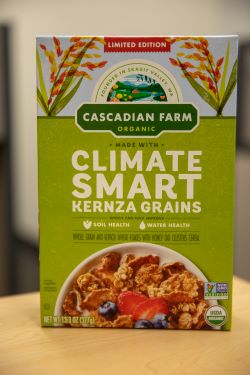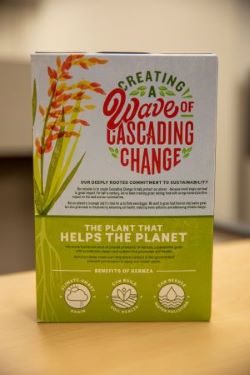
A climate smart cereal with CFANS roots
Cascadian Farm Kernza🄬 Flakes with Honey Oat Clusters Cereal benefits the environment with every spoonful

Consumers seeking sustainable and innovative food products have a crunchy, climate smart new option for their cereal bowls — Cascadian Farm Kernza🄬 Flakes with Honey Oat Clusters.
According to Whole Foods Market, grocery grains are refocusing on the environment in 2022, emphasizing grains grown via agriculture practices and farming processes that help address soil health. One such grain on the Whole Foods Market trend list is Kernza, the first commercially-viable perennial grain in the United States. It has a long, dense root system that can greatly reduce nitrate-nitrogen leaching and deliver other environmental benefits to soil, water and climate. It is also one of sixteen new perennial and winter crops and cropping systems being developed and improved by the University of Minnesota’s College of Food, Agricultural and Natural Resource Sciences (CFANS) Forever Green Initiative (FGI).
The Forever Green Initiative is focused on developing new crops, including Kernza, to ensure agricultural production to strengthen economies while protecting soil, water, and other natural resources. By coupling innovations in crop breeding, agricultural production methods, food science and utilization technologies, Forever Green is working to keep farmland in continuous living cover, add to the productivity and profitability of current agricultural systems and enable major improvements in water quality and soil health.
A key partner in Kernza development is The Land Institute, (which holds the trademark for the Kernza grain name), who invited FGI to partner on Kernza research over ten years ago. The Land Institute’s goal is to create an agriculture system that mimics natural systems to produce ample food and reduce or eliminate the negative impacts of agriculture. Through transdisciplinary research and collaborations, The Land Institute builds learning communities to help society cross the threshold into diverse, perennial grain agricultures.
Supply and market demand for Kernza continues to build. Farmers across the country are now growing Kernza, including a newly formed cooperative based in Minnesota called the Perennial Promise Growers Co-op. End users from international food companies — and brands like General Mills and Patagonia Provisions — to Minnesota millers, brewers and bakers are actively working with Kernza to meet consumer demands for products that go deep in both great taste and sustainability.
For more information on Kernza research and development, explore Kernza.org and the UMN Forever Green YouTube channel.







